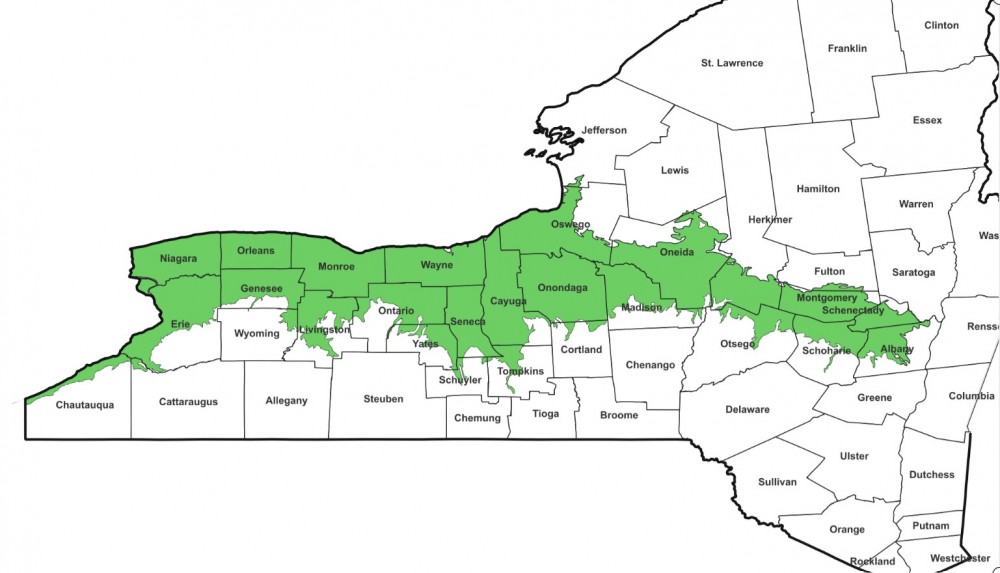Soil Health Opportunity for Dairy Farms - Erie County
Camila Lage, Dairy Management Specialist
Southwest New York Dairy, Livestock and Field Crops Program
Dear Dairy Producer,
The U.S. dairy community is collaborating on an important research initiative, the Dairy Soil and Water Regeneration project (DSWR), a six-year research initiative across 5 major dairy regions that is supported by a $10 million Foundation for Food and Agriculture (FFAR) grant.
The overall project is designed to provide measurement-based assessments of a dairy farm's greenhouse gas footprint for feed production. This work will help deliver foundational data to fill current research gaps, assist in the sharing of best practice soil health management systems and support potential new market opportunities related to carbon, water quality and soil health.
One goal of the project is to perform a baseline assessment to quantify the state of soil carbon stocks and soil health on forage fields that regularly receive manure and have had a range of tillage and management practices used. In this task, soil health indicators and soil carbon stocks will be quantified to provide insight into soil water movement, carbon cycling/storage, and nutrient cycling.
In New York, partnering organizations supporting this effort include Cornell University, Dairy Management Inc., and the American Dairy Association, North East.
If you are willing to take part, the time commitment would be relatively small. We will contact you by phone for a 5-10 minute discussion to better understand your management practices and gauge how many fields might fit our criteria for selection.
To sample your soil, a Soil Health Institute representative will visit your farm between May 23 to June 10. 2022 (exact day will be communicated to you before we sample). Once on site, the scientist would need a contact to confirm the correct fields for sampling, identify gates or access points, and gain an understanding of any protocols that should be followed on the farm. All samples will be taken by hand with no large equipment in the fields, ensuring sampling is non-destructive to crop progress.
The Soil Heath Institute will provide participants with an assessment of soil health and soil carbon stocks approximately 6 months after sampling. Furthermore, an aggregated report of soil health and carbon stocks from the New York region will be shared with you that shows how well your soil health and carbon stocks compare to others in the region. Participants in this sampling study will not be identified, and individual data collected as part of this effort will remain confidential.
If you are willing to take part in this important initiative, and/or have questions regarding the sampling or the project, please contact Mara Cloutier, Project Scientist at Soil Health Institute. She can be reached at mcloutier@soilhealthinstitute.org or by phone at (828) 708-3490.

Upcoming Events
Crops, Cows & Critters - Southwest New York Dairy, Livestock & Field Crops Newsletter Sponsorship
December 19, 2025
Our two forms of publications feature research-based and timely information from our four specialists, listed to the right, along with local event notifications and Cornell University outreach. This information is provided to participants who range from dairy, livestock, and field crops producers to agricultural suppliers and consultants.
Weekly Email Update: Shared with 625+ households who have signed up with our program.
Monthly Paper Mailer: To reach our stakeholders and farmers who lack internet access, we send out a monthly mailer where your company's logo and contact information would be featured with a mailing list of 330+ households.
If you sponsor our weekly and monthly publications you reach approximately 955 households.
Visit our website to view our newsletters!
2025 Cornell Food Beverage & Animal Feed Manufacturer Survey
December 19, 2025
Industry and Educational Advocates for New York State's Food, Beverage, and Animal Feed Manufacturing industries:
As you know, NYS has a diverse food and beverage manufacturing industry, in both the types of industries that exist and the wide distribution of firms by scale. Many manufacturing firms have strong backward linkages to agricultural production sectors in the state that support both farm-level and downstream food industry firms and consumers. In collaboration with the New York State Department of Agriculture and Markets, a team from Cornell University's Charles H. Dyson School of Applied Economics and Management has recently rolled out the 2025 New York State Food, Beverage, and Animal Feed Manufacturer Survey. The industry will benefit from an updated assessment of the industry that informs private and public investments and opportunities to support firm growth and improved profitability.
Cornell Organic Field Crops & Dairy Conference
March 6, 2026
Waterloo, NY
Farmers, researchers, educators, and agricultural service providers from across the Northeast are invited to the 2026 Cornell Organic Field Crops & Dairy Conference, held Friday, March 6, 2026, from 8:00 a.m. to 4:30 p.m. at the Lux Hotel & Conference Center in Waterloo, N.Y.
Co-hosted by New York Soil Health and Cornell CALS, the annual conference brings together leaders in organic grain, dairy, and livestock systems to share practical tools, new research, and farmer-tested strategies to support resilient and profitable organic production.
Announcements
No announcements at this time.





